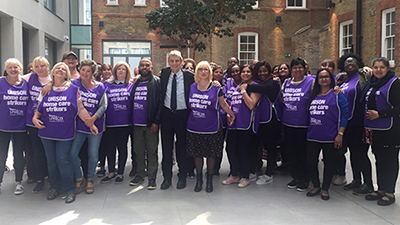If there was just one point that Mandy Buckley could convince her employer of, it would be to value carers properly.
“I’ve been a carer for 17 years now,” she says.
Mandy is part of Birmingham City Council’s enablement team – a dedicated, qualified and experienced group that is “the first port of call when somebody comes out of hospital”.
Patients are first assessed in hospital before being discharged. Then the enablement team takes up the baton.
Initially, the team works with the discharged person for up to six weeks as a care provider, all the while continuing to assess what sort of care package they require in the longer term.
“Some are kept on longer: 12 weeks, 14 weeks, according to the needs of each client,” Mandy adds.
Team members deal with medication, hydration, nutrition and much more. Mandy says that in some ways, they’re “like district nurses”, Mandy says. For instance, they administer medication and check for pressure sores.
Some clients have a physical disability, some have dementia. In many cases there are multiple and complex issues.
But not only do Mandy and her colleagues help someone to deal with these sort of conditions, and provide ‘personal care’ – helping people wash and dress, for instance – they also provide “company and contact”, not least for those “people who never see anyone”. And on occasion, team members also find themselves helping people with bereavement.
Not all their clients are elderly: the team provides care for clients from 18 years of age up.
Where some carers in other parts of the country are strictly limited to 15-minute visits only, members of the enablement team “stay until all needs are met”.
Mandy loves her job. “It’s person-centred. Every day is different. You need to have empathy, but it’s amazing enabling and empowering people.”
Why would anyone not value the work that Mandy and her colleagues do?
But the crisis in funding for local government has seen the city council come up with a plan to cut the carers’ hours – and with that, their pay.
At present, Mandy works 25 hours a week for around £12,000 a year (about £9.81 an hour). If the council pushes ahead with its plan, then she could find herself put on just 14 hours a week – a loss of £6,000 a year. And to make matters even worse, she would also lose her working tax credits, because she only had 14 hours and not at least 16.
Her husband also works for the council. He works part-time and would like more hours, but there’s no chance of that at the moment.
So such a cut in her hours would leave the couple struggling to pay for basics, such as their mortgage.
There has been a suggestion that, in such a situation, carers could go and find another job, but this doesn’t take into account a number of difficulties, such as the 11-hour rule, which means that workers need an 11-hour break between working days.
So if Mandy did one of the proposed shifts of seven to 11 in the morning, then any second job would have to be finished by eight in the evening if she wasn’t to breach that rule. Equally, it would rule out evening work.
But the council’s plans also include carers working a rota pattern that, for instance, would see them working one Tuesday and then not the next one and then the one after. That too would make it incredibly difficult to take another job.
And this is without mentioning that council contracts mean that the council itself has to approve any employee taking a second job.

Birmingham care workers with Dave Prentis at UNISON Centre. Mandy is to Dave’s left
And that’s why Mandy and her colleagues are striking and why, on their seventeenth day of their escalating industrial action, Mandy and many of her fellow members – the vast majority of them women – visited UNISON Centre in London to meet senior officers.
Assistant general secretary Liz Snape said that it wasn’t hard to conclude that the council had looked around and thought: “let’s pick on the weakest group”, believing that a bunch of low-paid women wouldn’t put up much resistance.
But the Labour council counted without these UNISON members. As the rep for the carers, Mandy is amazed at “how active we’ve become. We all thought we’d never be able to do what we’ve done”.
Pledging the union’s full support, general secretary Dave Prentis said to them: “We will win – we cannot afford Birmingham City Council to win because every council across the UK will be watching and thinking that, if a Labour council can get away with something like this, then so could they.”
Mandy is fighting on – not just for herself and her own family, but also because she dreads the impact on vulnerable people throughout Birmingham if the plan is pushed through.
The care service suffered 48% cuts last year and this latest attempt, in the name of ‘efficiency’, would reduce the service by a further 25%, leaving more families and vulnerable adults struggling to get the free care that they desperately need.
Efficiency for whom, then? No wonder that Mandy says of the council: “They should value the enablement homecare service”.
And who could argue with that?
See UNISON’s Ethical Care Charter on how your union is campaigning on care
The article It’s time to value our carers first appeared on the UNISON National site.
from RSSMix.com Mix ID 8239598 https://www.unison.org.uk/news/article/2018/09/time-value-carers/
via IFTTT
source https://childrensplayareadesigns.tumblr.com/post/177696236977
No comments:
Post a Comment